
I grew up Catholic and attended Santa Clara University (SCU), a Jesuit institution. Although I no longer identify with Catholicism, my Jesuit education instilled a value I hold dear—service to community. When I attended SCU, the University’s academic schedule left Wednesdays open for volunteering or engaging in service learning projects. I certainly didn’t spend all my Wednesdays volunteering, but it did create a culture where service was not only considered important, but expected. I owe my academic career to one such experience in college, but that is another story.
So imagine my surprise to be here in Croatia, where just over 86% of the residents are Catholic, that this sense of service to community is nearly non-existent. In my visit to Libertas University, I met Anja Marković, the Executive Director of Bonsai , who is working to change the culture of volunteering in Dubrovnik. Bonsai is a relatively new non-profit organization that was founded in 2008 and reimagined in 2010 that put volunteering as its center. Their mission is to increase community engagement through volunteering based on the values of tolerance and respect, active participation, and social sustainability.

I spent time with Anja on two occasions—a beautiful sunset dinner with the two resident directors of API at Libertas University (Nada and Ivana) and a day trip to Šipan with her and members of other NGOs/volunteers. Anja is a psychologist very much dedicated to addressing the needs of those who are marginalized within this community, especially those with mental illness and learning/physical disabilities. She works hard to recruit and engage others in service.
One of the things I have loved about my own personal journey here is a connection to family and a better understanding of my heritage. Family is central and certain structures are in place to support the family. For example, women are given six months maternity leave with full pay and if she wants to take the entire year off, she can get half of her salary for the remaining six months. If a woman has a third (or more) child, she is allowed to take three years off with an income of approximately $300 US dollars. I’ve discovered a wonderful website: Expat in Croatia and it outlines more about family leave policies if you’re interested. But, Croatian salaries are low—an average of 6420 kuna per month (approximately $962 US dollars). According to the most recent data from Croatia’s gender equality ombudswoman, the gender wage gap is 13.19% (women make less) and that gap has been increasing since 2010. Similar to the US, women tend to be employed in occupations that pay less—education, non-profits, and healthcare (and certainly is true of those who I have met). But, I digress…the other side of a family-centric culture is that the burden of care for mental or physical illnesses fall heavily on the family–primarily women. Mental illness or learning disabilities are particularly stigmatized so families are reluctant to reach out to those like Anja who can provide psychological support.



The photos above are from our day at the beach in Šipan where a member of the group found some beautiful starfish! Don’t worry, they were all returned to the sea.
I was also shocked to learn that there is no infrastructure provided for domestic violence or sexual assault. There are no shelters for domestic violence or support for those who are victims of intimate partner violence. There is no sex education in schools at any level but it is mandatory to take a religion class (specifically Catholicism). In fact, even at a University level, there are no courses where one can study gender or sexuality, at least in Dubrovnik (my colleagues said that it is different in Zagreb). I hope to work with Anja and Libertas University to build an event here in Dubrovnik (e.g., Take Back the Night) when I return with study abroad students.
And it’s not true that people don’t volunteer here, it’s the nature of it. One of my cousins gives one hour of her time per week to a church in the Old City so that it can remain open 24-hours a day to visitors (can you imagine taking the 2-3 am shift??). During busy hours, there is more than one person in the church which translates to hundreds of volunteer hours per week. I wonder what might happen to the level of volunteering if the required religion classes emphasized the Jesuit value of service to one’s community.

Great timing! Our trip back from Sipan coincided with the sunset.































